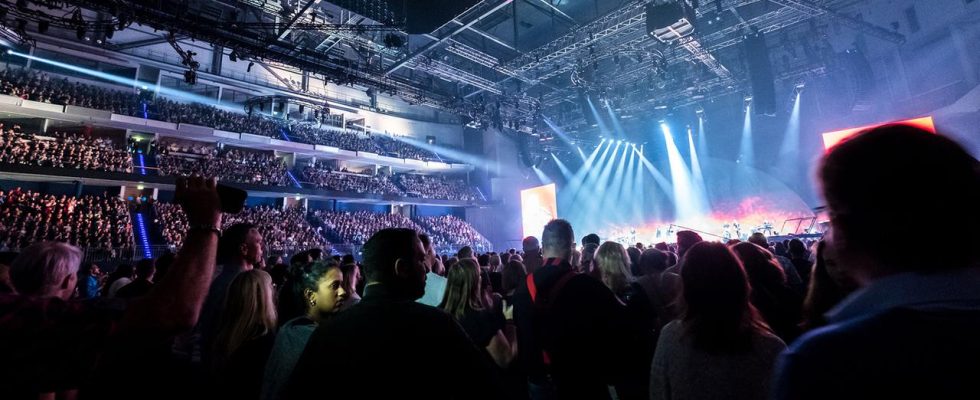exclusive
After the Rammstein allegations, activists came together to set up a platform for those affected by sexualized violence and discrimination in the music industry.
A well-known German rapper who takes a fan to the hotel after the book signing and rapes him there. An artist who autographs a minor on her breasts against her will. A successful rapper who threatened a woman with a knife in his apartment and then abused her.
Almost two years ago to the day, activists began to publish dozens of reports on Instagram under the name “deutschrapmetoo” and numerous references to the problematic power structures in the music industry.
Hundreds of people responded within a few months to a call for sexualized violence in the German rap scene, the activists say in an interview NDR and “Süddeutsche Zeitung”.
You now have a table with 70 German rap artists who have been accused by those affected. In some cases, several people have reported allegations about the same artists.
“Toxic Masculinity”
The activists then had contact with all those affected, and they then published many of the experiences anonymously on their Instagram channel. In doing so, they also attracted the hatred of many fans and rappers, they report.
Already in the first days after publication, they were wished that they would be raped. Instagram users created their own accounts to reveal the identity and addresses of the activists.
“The threat became very acute very quickly.” There were also some rappers who put their followers on the activists. “It was like a little army of toxic masculinity.” This is one of the reasons why they continue to appear anonymously in public.
Network from the music industry
The publications about the band Rammstein and their front singer Till Lindemann motivated the activists to expand their project. Since Monday evening, as “musicmetoogermany”, they have been collecting experience reports not only for German rap, but for the entire German music scene.
“We saw it as our duty to intervene,” say the two founders, because Lindemann is not an isolated case. After a review, they want to publish the testimonials anonymously on a new website and their Instagram channel. Behind it is now a network from the music industry – of activists, artists and interest groups, including the agency “Safe the Dance”, Music S women* and Music TH women*.
In the future, there will also be educational offers and information on discrimination and corresponding contact points. The activists also want to make other experiences, such as racist discrimination or transphobia, visible.
confidentiality obligations required
More than a dozen women had been in talks with just over two weeks ago NDR and “Süddeutsche Zeitung” reported how they were specifically approached by several people from Lindemann’s environment, often via Instagram or at the concerts themselves, to come to after-show parties specially organized for Lindemann and have sex with him there. This is what happened in different cities across Europe, always with a very similar process.
Two women also told the reporters about alleged sexual acts that they had not consented to. For specific questions about the allegations by NDR and SZ, Rammstein and Lindemann have not yet commented on the content. However, Lindemann has denied the allegations as untrue through a lawyer.
The creators of “musicmetoogermany” report that they have repeatedly been told about problematic situations at such parties, including from many German rap artists. For example, before entering the backstage area, young women had to sign contracts that bound them to secrecy.
“When you’re 16 years old and come into a backstage area, it makes sense for you. You think: Yes, of course, this is a megastar and he needs his privacy,” says one of the activists.
Hierarchy between fan and artist
The power gap between artists and their fans is enormous: “The person first gets a leap of faith per se because you, as a fan, have been dealing with the person for a long time.” Those who are invited to the backstage area often feel chosen. This hierarchy between fan and artist can be exploited unilaterally.
At festivals and concerts, many people work for the artists, from management to stage builders. That’s a lot of people who could see potential border crossings.
“Protection of offenders is a huge issue,” say the founders of “musicmetoogermany”. “What you can say in any case: These attacks can only happen because very, very many people look the other way, consciously look the other way, again and again.”
Listen to those affected
The question of the extent to which artist and work can be separated in sexist texts has been discussed not only since the allegations against Lindemann. In March 2020, Lindemann published a poem in which he wrote about the rape of unconscious women. The activists from “musicmetoogermany” criticize that such texts are still socially accepted.
“Artists always have influence,” say the activists. “Certain texts and attitudes create an atmosphere.” However, they emphasize that this does not mean that artists who sing about violence and misogyny are more dangerous than others. They know from the letters from those allegedly affected by sexualised violence in German rap that artists with a softer, more positive image have evidently already become perpetrators.
The activists say they have experienced sexualized violence themselves. From your experience you know how important it is to listen to the experiences of those affected.
They had toyed with the idea of expanding their activism to other genres of music for some time. Due to the reporting and the media attention to Rammstein, the time has now come for them.

